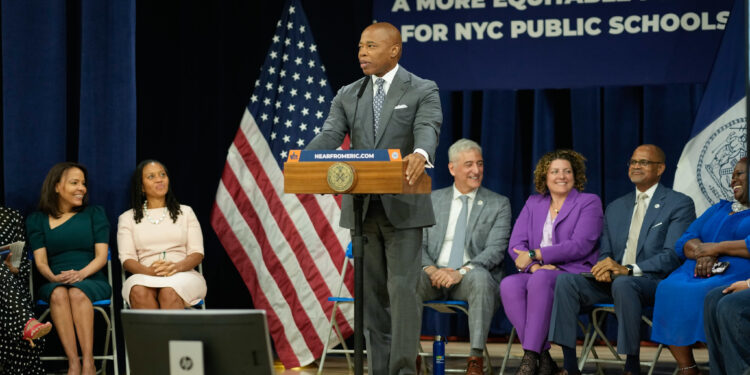New York City is trying to address disparities in math education by implementing a standardized curriculum across middle and high schools.
The initiative, dubbed “NYC Solves,” hopes to tackle the stark racial gaps in state test scores.
Mayor Eric Adams and Schools Chancellor David Banks announced the plan on Monday, June 24th, citing the need for a unified approach to math instruction.
Adams said, “Our new Division of Inclusive and Accessible Learning will focus on supporting multilingual learners, and students with disabilities so every student can excel academically, be prepared for a rewarding career, and economic security — no matter their background or needs.”
The mayor continued, “And ‘NYC Solves’ will transform how we are teaching math in New York City and continue our track record of improving math scores by double digits.”
Chancellor Banks noted that the initiative reinforces the district’s commitment to prioritizing every student’s lifelong success.
“Schools all over the city, even on math, were just kind of doing their own thing. That’s no way to run a system,” Banks stated at a press conference at Samara Community School in the Bronx.
The program will see 420 high schools adopt Illustrative Mathematics for Algebra 1 by this fall.
The curriculum focuses on building conceptual understanding rather than step-by-step procedures. Middle schools will follow suit over the next three years, choosing from approved programs by i-Ready, Amplify, and Illustrative Math.
The move comes in response to concerning statistics: less than half of the city’s elementary and middle school students achieved proficiency on state math exams last year.
The disparity is even more pronounced when broken down by race.
Last year, 34.3% of Black students and 35.7% of Latino students achieved proficiency in their math exams, in stark contrast to 70.2% of white students and 77.6% of Asian American students.
Banks stressed the urgency of the situation, saying, “As the data shows, not only do we have a literacy crisis in this country, we absolutely have a math crisis as well. And this struggle with math, for many of us, runs very deep, and it starts early.”
Many educators welcome the change, but some express concerns about the new curriculum’s structure and ability to meet struggling students’ needs.
Marielys Divanne, executive director of Educators for Excellence, supported the initiative, stating, “NYC Solves is another huge and much-needed step forward in helping our students achieve better outcomes in math.”
The city has allocated $34 million over five years for “NYC Solves.” The initiative will roll out in phases, starting with select districts that have volunteered to participate.









